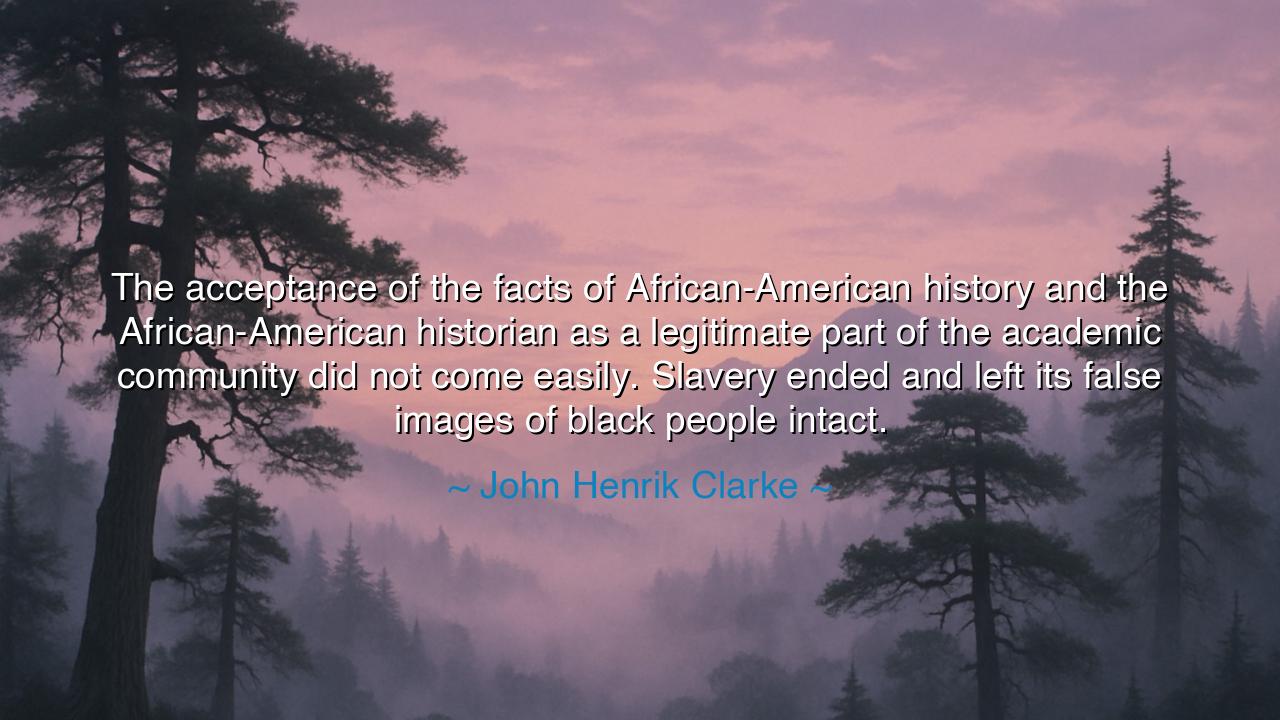
The acceptance of the facts of African-American history and the
The acceptance of the facts of African-American history and the African-American historian as a legitimate part of the academic community did not come easily. Slavery ended and left its false images of black people intact.






John Henrik Clarke, the warrior-scholar of African consciousness, once declared: “The acceptance of the facts of African-American history and the African-American historian as a legitimate part of the academic community did not come easily. Slavery ended and left its false images of black people intact.” These words rise not merely as a lament, but as a testament — a fire forged from centuries of distortion and silence. In them, Clarke speaks to the tragedy that even when chains were broken, the mind remained bound — bound by the lies of history, by the deliberate erasure of truth, and by the lingering shadows of oppression disguised as scholarship. His voice was both an indictment and an awakening, calling his people — and all humanity — to remember what had been hidden and to reclaim what had been stolen.
The meaning of this quote lies in the recognition that freedom is incomplete without truth. Clarke reminds us that the abolition of slavery did not end the war against the Black spirit; it merely changed its battlefield. The plantation gave way to propaganda, the whip to the pen, and the auction block to the classroom. The false images he speaks of — those caricatures that painted the African as inferior, primitive, or dependent — were tools of domination, meant to ensure that even in freedom, Black people would remain enslaved in the world’s imagination. To correct this, Clarke understood, required not just protest but reconstruction of history itself — for whoever controls history, controls identity, and whoever controls identity, controls destiny.
The origin of Clarke’s conviction can be found in his own life. Born in the early 20th century in Union Springs, Alabama — a world still steeped in segregation — he was told by his teacher that there were no Black people in history who had achieved greatness. That wound became his mission. He devoted his life to unearthing the buried record of African civilization, from the temples of Nubia to the libraries of Timbuktu. He became one of the foremost architects of Afrocentric scholarship, restoring to the world the truth that Black people had been builders of nations, creators of philosophy, and keepers of wisdom long before the West awoke from its darkness. Yet even as he wrote and taught, Clarke faced resistance from the very institutions that claimed to honor truth — universities that dismissed his research, peers who mocked his methods, and systems that guarded their myths like sacred relics. His struggle was the living embodiment of his own words: acceptance did not come easily.
To understand his warning, we must look to the history he sought to heal. When slavery ended in 1865, the chains were struck from the body, but the mind of the oppressor — and thus the culture of the nation — remained infected by racism. Through pseudoscience, religion, and education, the image of the African was recast as the “former slave,” never as the original builder. Textbooks celebrated conquerors but silenced creators. Universities studied Africa not as the cradle of civilization, but as an appendage of Europe’s adventure. Even well-meaning historians repeated lies inherited from empire, until generation after generation came to mistake distortion for fact. Clarke, therefore, fought not just for inclusion in academia, but for a rebirth of truth — to make the historian himself a revolutionary, a restorer of human memory.
Consider the example of Carter G. Woodson, the father of Black History Month, whose own work mirrored Clarke’s struggle decades earlier. In 1915, Woodson founded the Association for the Study of Negro Life and History because no university would host his research. He knew, as Clarke later would, that a people who are ignorant of their past are vulnerable to the narratives of others. Woodson’s mission — to document, publish, and teach the true contributions of African-Americans — was revolutionary precisely because it defied the false image left by slavery. His work opened the door that Clarke would later walk through, transforming not just how history was told, but who had the right to tell it.
In Clarke’s quote, there also lies a challenge to the present: the work of liberation is not finished. Though slavery has long been abolished, its echoes persist in the stories we teach, the images we consume, and the hierarchies we accept without question. The historian’s task, he reminds us, is sacred — to guard the truth against erasure, to speak where silence has been imposed, and to restore humanity where it has been denied. For truth is not merely knowledge; it is justice made visible through memory.
The lesson, then, is clear and eternal: freedom without self-knowledge is illusion. To build a future of equality, one must first reclaim the past from the hands of distortion. Seek not history as written by the victors, but as lived by the voiceless. Study the lives of your ancestors not as curiosities, but as chapters of your own story. Teach the young that they are not descended from slaves, but from survivors, inventors, kings, and queens — from thinkers who carved meaning from suffering and built worlds in the face of annihilation.
So remember the wisdom of John Henrik Clarke: though the false images may linger, truth endures, waiting for the brave to unearth it. Do not be content with what you are told; question, seek, and rebuild. For when a people reclaim their history, they reclaim their dignity, their destiny, and their divine reflection. Slavery may have ended, but the struggle for the truth of the African spirit continues — and through remembrance, resistance, and rebirth, it shall one day be fully free.






AAdministratorAdministrator
Welcome, honored guests. Please leave a comment, we will respond soon